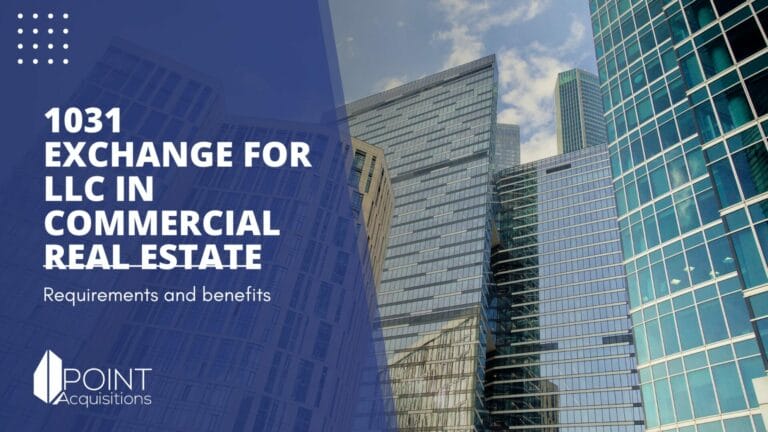
1031 Exchange for LLC in Commercial Real Estate
Learning how to preserve wealth and minimize taxes is crucial in commercial real estate. However, many real estate investors face the challenge of high capital gains taxes, especially when it comes time to sell their valuable investment property.
These tax implications can be daunting for a Limited Liability Company (LLC), potentially eating into the profits generated from years of strategic investments. The complexity of navigating through tax regulations adds another layer of stress, especially for LLCs dealing with large-scale commercial properties.
Enter the 1031 exchange – a lifeline for real estate investors. This provision under the Internal Revenue Code offers a way to defer capital gains taxes, allowing you to reinvest the profits from a sold property into a new replacement property.
For LLCs involved in commercial real estate, the 1031 exchange is not just a tax strategy; it’s a critical business tool whether a single-member LLC or a multi-member LLC; leveraging this exchange can mean the difference between a successful investment strategy and a missed opportunity.
The article will explore how LLCs can effectively navigate the 1031 exchange process and maximize their commercial real estate investments.

Table of Contents
Key Takeaways
- 1031 exchanges allow for tax deferral in real estate, requiring like-kind replacement properties and timely completion. They are strategic tools for real estate investors, particularly in the commercial sector.
- Single and multi-member LLCs leverage 1031 exchanges for flexibility and tax benefits in commercial real estate transactions. They offer asset protection and facilitate continuous investment growth.
- Multi-member LLCs navigate 1031 exchange complexities using strategies like drop and swap, exchange post distribution, and pre-exchange pre-distribution, addressing diverse investment goals.
- Adherence to IRS regulations is critical in 1031 exchanges, and the role of qualified intermediaries and tax advisors is indispensable for ensuring compliance and maximizing benefits.

1031 Exchange Basics
A 1031 exchange, rooted in the Internal Revenue Code, offers a strategic pathway for commercial real estate investors. This tool allows for the deferral of capital gains taxes when an investment property is sold, and the proceeds are reinvested into a new property. The primary goal here is to encourage continuous investment growth without the immediate tax burden, crucial for large-scale commercial real estate transactions.
Key Requirements and Benefits for Commercial Real Estate
For commercial real estate, the requirements include selling a property used for investment purposes and acquiring a like-kind replacement property. This exchange transaction must be completed with a qualified intermediary, ensuring proper adherence to the rules.
The benefits for LLCs in this domain include:
- deferred taxes
- preservation of capital
- the opportunity to reposition or diversify the real estate portfolio
This strategy aligns with tax purposes and supports strategic business growth for entities like single-member LLCs or multi-member LLCs.
LLCs and 1031 Exchanges
Limited Liability Companies (LLCs) are pivotal in commercial real estate, primarily due to their flexible business structure and liability protections. These entities often hold real property interests, managing investments ranging from office buildings to retail complexes.
In this industry, LLCs bridge individual ownership and corporate structure, offering a blend of personal asset protection and operational flexibility.
The distinction between single-member and multi-member LLCs is significant. A single-member LLC is owned by one individual or entity, offering simplicity in decision-making and tax filings. It is often seen as a disregarded entity for tax purposes, meaning its activities are reported on the owner’s tax return.
In contrast, a multi-member LLC has two or more owners, potentially offering broader investment opportunities and shared decision-making. However, it requires more complex tax filings and member agreements, especially when engaging in 1031 exchanges.

Advantages of Using LLCs for 1031 Exchanges:
- Tax Benefits: LLCs can leverage 1031 exchanges to defer capital gains taxes, thus retaining more capital for reinvestment.
- Continuity: For multi member LLCs, these exchanges facilitate the seamless transition of property interests without disrupting the underlying business structure.
- Flexibility in Ownership: Allows one or more members to realign their investment property portfolio without immediate tax implications.
- Asset Protection: LLCs protect against personal liability, which is especially important in large-scale commercial transactions.
- Estate Planning: Facilitates the transfer of property interests within an LLC, aiding in succession planning.
- Diversification: Enables LLCs to diversify their investments across different types of commercial properties.
Multi-Member LLCs and 1031 Exchanges
Multi-member LLCs in commercial real estate face unique challenges in 1031 exchanges. Coordinating among one or more members with different investment goals can be complex. Additionally, key concerns include ensuring that every member adheres to the Internal Revenue Code and maintaining the integrity of the partnership structure during the exchange process.
Strategies to Navigate These Challenges:
- Drop and Swap
- Exchange Post Distribution
- Pre-exchange Pre-distribution
These strategies require careful planning and often the involvement of tax advisors to ensure compliance and effectiveness. Let’s examine them a little closer.
Drop and Swap transactions
The “Drop and Swap” strategy for multi-member LLCs in a 1031 exchange involves restructuring the LLC’s ownership interests before the sale of the property. Here’s how it generally works:
- Pre-Sale Ownership Restructuring: The LLC “drops” down to a tenancy-in-common (TIC) arrangement or a similar structure before selling the investment property. This means the LLC members become direct co-owners of the property, each holding an undivided interest.
- Individual Member Decisions: After the restructuring, each member now has the flexibility to decide whether to participate in a 1031 exchange or to cash out their share. Members who engage in a 1031 exchange can independently identify and acquire new investment properties.
- Tax Considerations: It’s crucial for this restructuring to occur well in advance of the property sale to comply with IRS guidelines. The timing is key to ensure that the IRS views the “drop” as a legitimate change in ownership and not merely a step transaction designed to circumvent tax laws.
LLC multi-members might consider a “drop and swap” in a 1031 exchange for commercial real estate (CRE) when individual members have differing investment goals or plans for their property shares.
This approach is particularly relevant when some members want to reinvest their proceeds in another property to defer capital gains taxes, while others may prefer to cash out.
The drop and swap allows each member to pursue their desired path, respecting their individual investment strategies and objectives within the framework of a 1031 exchange.
Exchange Post Distribution
The “Exchange Post Distribution” strategy involves the LLC distributing its real estate property directly to its members before the sale. This distribution results in each member holding an individual undivided interest in the property. After the distribution, members can independently engage in a 1031 exchange with their respective shares.
Multi-member LLCs might choose this strategy when members have different investment objectives and wish to pursue separate 1031 exchanges. This approach allows each member greater control over their investment decisions post-distribution, aligning with their financial goals or reinvestment plans.
Pre-exchange Pre-distribution
The “Pre-exchange Pre-distribution” strategy is another option for multi-member LLCs involved in 1031 exchanges. The LLC restructures its ownership interests before selling the property in this approach.
Members receive direct interest in the property, converting their LLC interests into tenancy-in-common (TIC) interests. This restructuring allows each member to independently engage in a 1031 exchange or other transactions with their share of the property.
Multi-member LLCs may opt for this strategy when members have diverging investment strategies but need to act before selling the property. It’s useful in aligning individual member objectives with the broader goals of the LLC, especially in scenarios where some members wish to continue investing in real estate. In contrast, others might prefer different ventures or liquidation.

Best Practices for LLCs in 1031 Exchanges
Early Planning:
- Timeline Management: Successful LLCs plan their 1031 exchanges well in advance. This includes identifying potential replacement properties early and understanding the critical timelines for 1031 exchanges.
- Regulatory Compliance: Early planning ensures compliance with IRS rules, minimizing legal and tax complications.
Expert Advice:
- Qualified Intermediary: Engaging a qualified intermediary is essential. They guide the process and ensure that all IRS regulations are met.
- Legal and Tax Consultants: Expert advice from attorneys and CPAs can provide tailored strategies and insights, particularly for complex multi-member LLC scenarios.
Communication Among Members:
- Regular Meetings: Establishing regular meetings ensures all members are informed, and decisions are made collaboratively.
- Written Agreements: Clear documentation of agreements among members can prevent misunderstandings and legal disputes.
Incorporating these best practices can significantly enhance the effectiveness and efficiency of 1031 exchanges for LLCs in commercial real estate.
Legal and Tax Considerations
For LLCs in commercial real estate, strict compliance with IRS regulations is critical in 1031 exchanges. This includes:
- meeting deadlines
- ensuring the replacement property is like-kind
- correctly handling the exchange funds.
Non-compliance in a 1031 exchange can lead to significant financial consequences. If the IRS rules are not followed, the entire transaction could be disqualified, resulting in substantial capital gains taxes. Penalties and interest might also be imposed, adding to the financial burden.
Role of Qualified Intermediaries and Tax Advisors
- Qualified Intermediaries: Essential for facilitating the exchange, holding the sale proceeds, and purchasing the new property.
- Tax Advisors: They provide crucial guidance on tax benefits, helping LLCs navigate complex tax implications, especially in multi-member scenarios.
Though not legally required, a QI is highly recommended. They ensure proper handling of funds and adherence to IRS guidelines.
Completing a 1031 exchange without a tax advisor is also possible but risky, especially for complex LLC structures. Advisors offer invaluable insights into tax implications and compliance.
Both roles greatly contribute to successfully executing a 1031 exchange, providing expertise and peace of mind.
Partner with Point Acquisitions for Efficient 1031 Exchanges
If you’re planning a 1031 exchange, partnering with Point Acquisitions is a strategic move. Our expertise in purchasing commercial real estate can fast-track the sale of your relinquished property. This efficient process gives you more time to focus on finding the right like-kind replacement property, ensuring a smoother and more successful 1031 exchange.
Contact us for more details and discover how Point Acquisitions can be an integral part of your investment strategy.
Conclusion
Understanding 1031 exchanges is crucial for LLCs in commercial real estate. These exchanges offer significant tax benefits and strategic flexibility, which is especially important for single and multi-member LLCs.
Adherence to legal and tax regulations and the strategic use of qualified intermediaries and tax advisors ensures a smooth and beneficial exchange process.
Partnering with Point Acquisitions can be a game-changer for those looking to sell commercial real estate efficiently and effectively. Our expertise in swift transactions can greatly benefit your 1031 exchange process. Connect with Point Acquisitions for exceptional results in your commercial real estate ventures.

FAQs
Can an LLC exchange partnership interest in a 1031 exchange?
No, partnership interests are not eligible for 1031 exchanges. The exchange must involve real property.
Is personal property included in 1031 exchanges for LLCs?
Personal property does not qualify for 1031 exchanges. These exchanges are limited to real estate.
How does fractional interest work in a 1031 exchange for an LLC?
LLC members can hold fractional interests in the property being exchanged, allowing them to participate partially in the 1031 exchange.
Can an LLC exchange one property for multiple properties?
Yes, an LLC can exchange one property for multiple properties, diversifying their real estate investments.
What’s the impact of 1031 exchanges on real estate investing for LLCs?
1031 exchanges offer tax deferral benefits, making them a strategic tool in real estate investing for LLCs.
Are there limitations on the type of property interest that can be exchanged?
The exchanged properties must be like-kind, meaning they are both used for investment or business purposes.
About The Author

Jesse Shemesh
Disclaimer
Please note that Point Acquisitions is not a tax expert or tax advisor. The information on our blogs and pages is for general informational purposes only and should not be relied upon as legal, tax, or accounting advice. Any information provided does not constitute professional advice or create an attorney-client or any other professional relationship. We recommend that you consult with your tax advisor or seek professional advice before making any decisions based on the information provided on our blogs and pages. Point Acquisitions is not responsible for any actions taken based on the information provided on our blogs and pages.
1031 Exchange Capital Gains Tax Deferral
According to a 2021 report by the National Real Estate Exchange Services (RES), over 240,000 1031 exchange transactions were completed in the United States, totaling $100 billion. This impressive figure underscores the role of 1031 exchanges in the real estate…
Read More1031 Exchange Benefits
As of Q4 2023, the national vacancy rate for all commercial property types in the United States sat at 9.2%, according to CBRE’s latest insights and research. This represents a slight decrease compared to the previous quarter and suggests a…
Read More1031 Exchange Legal Considerations: A Must-Read Guide
You’re in the right place if you’re considering a 1031 exchange for your commercial real estate investments. Whether you’re a seasoned investor or just dipping your toes into the market, understanding the legal landscape of 1031 exchanges is key to…
Read More

